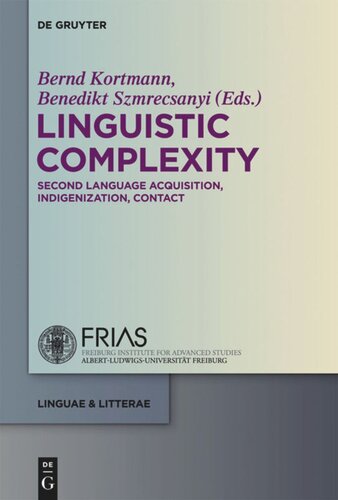

Most ebook files are in PDF format, so you can easily read them using various software such as Foxit Reader or directly on the Google Chrome browser.
Some ebook files are released by publishers in other formats such as .awz, .mobi, .epub, .fb2, etc. You may need to install specific software to read these formats on mobile/PC, such as Calibre.
Please read the tutorial at this link: https://ebookbell.com/faq
We offer FREE conversion to the popular formats you request; however, this may take some time. Therefore, right after payment, please email us, and we will try to provide the service as quickly as possible.
For some exceptional file formats or broken links (if any), please refrain from opening any disputes. Instead, email us first, and we will try to assist within a maximum of 6 hours.
EbookBell Team

0.0
0 reviewsLinguistic complexity is one of the currently most hotly debated notions in linguistics. The essays in this volume reflect the intricacies of thinking about the complexity of languages and language varieties (here: of English) in three major contact-related fields of (and schools in) linguistics: creolistics, indigenization and nativization studies (i.e. in the realm of English linguistics, the “World Englishes” community), and Second Language Acquisition (SLA) research: How can we adequately assess linguistic complexity? Should we be interested in absolute complexity or rather relative complexity? What is the extent to which language contact and/or (adult) language learning might lead to morphosyntactic simplification? The authors in this volume are all leading linguists in different areas of specialization, and they were asked to elaborate on those facets of linguistic complexity which are most relevant in their area of specialization, and/or which strike them as being most intriguing. The result is a collection of papers that is unique in bringing together leading representatives of three often disjunct fields of linguistic scholarship in which linguistic complexity is seen as a dynamic and inherently variable parameter.